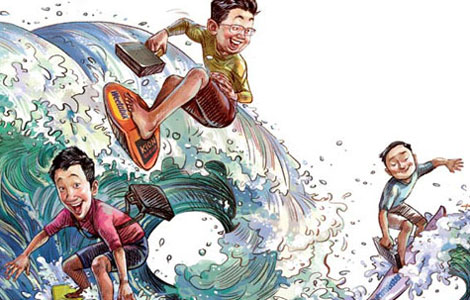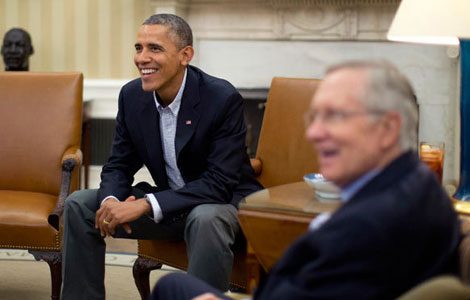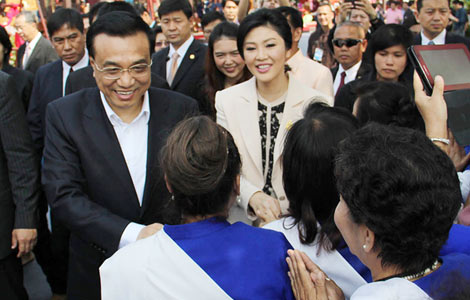Utilize diverse cultural traits to expand soft power
Updated: 2013-10-15 07:22
By Ku Ma (China Daily)
|
||||||||
Are you a fan of Sherlock Holmes? Do you think the Arthur Conan Doyle-created character can take on Edward Snowden, the former US National Security Agency operative who exposed Washington's controversial global surveillance program? If "yes", how about a cat-and-mouse game between Holmes and Snowden?
In fact, such a game (actually a play) was recently staged as part of a US TV series in which Holmes is portrayed as a resident in modern-day New York. Holmes tracks down the whistle-blower (with a name similar to Snowden) who has drawn global attention by leaking classified secrets to a journalist. The whistle-blower, however, is not a person holding aloft the flag of "Internet freedom" (something the US swears by), but an "enemy" of American national security suspected of even murdering a girl during his escape to Venezuela. The TV play apparently tries to tarnish the "heroic image" that Snowden has acquired across the world.
It's surprising, nay shocking, to see the US accusing Russia and China of online spying only to spy on its neighbors and allies, and even American citizens, in most cases without any reason. And as Snowden reiterates in video clips posted by WikiLeaks over the weekend, the US surveillance program is making people's life less safe.
Alluring as it is, the Holmes TV drama is a small example of how American pop culture serves Washington's strategies and diplomacy. In 2005, the US Department of State issued a report, "Cultural Diplomacy: The Linchpin of Public Diplomacy", saying that "cultural diplomacy is the linchpin of public diplomacy, because it is through cultural activities that a nation's idea of itself is best represented".
Two years later, the US government issued the US National Strategy for Public Diplomacy and Strategic Communication, saying "the strength, success and security of the United States of America rest on our commitment to certain fundamental values and principles" and requires all diplomatic efforts to promote these American values.
Apart from the Holmes TV play, two films, complete with robot wars against aliens - Pacific Rim (2013) and Battleship (2012) - promote the US' maritime strategy vis-a-vis China's disputes with some of its neighbors. In both films, only the close military allies of the US and Japan succeed in saving the Asia-Pacific region from the invasion of evil aliens.
Of the two films, Pacific Rim is more propagandistic. Robots made by Russia and China, which boast of their war strategy and skills, are included in the US-Japan-led fight to save the Asia-Pacific, but their robots are defeated at the very beginning of the battle. In the end, the American hero and Japanese heroine restore peace in China's Hong Kong and the rest of the world.
Such films are desperate to highlight the military power of the US, supported by its allies, by making use of the maritime disputes that China has with some of its neighbors. But such attempts to drive a wedge between China and its neighbors will fail, because China is more averse to conflict than any other country.
In fact, during their recent visits to Southeast Asian countries, President Xi Jinping and Premier Li Keqiang sent out a clear message to the world that the disputes in the South China Sea are manageable, and China-ASEAN ties are on a sound and pragmatic track.
On Oct 4, during his visit to Malaysia, Xi congratulated Malaysian singer Fish Leong for her popularity in China. And highlighting Sino-Thai friendship during his address to the Thai parliament on Oct 12, Li said last year's biggest blockbuster in China Lost in the Thailand could be an advertisement for Sino-Thai friendship.
Also, during his visit to Tanzania in March, Xi said the Chinese TV series, The Good Times of Daughters-in-Law, has to a certain extent helped bridge the cultural gap between African and Chinese people.
There is no doubt that China still lags behind the US in terms of cultural diplomacy, especially pop culture diplomacy. But China begins to realize the pop culture's special role. Pop culture could be a catalyst to bring people of different countries closer as pop culture is more acceptable for ordinary people. There is no politics involved in the popularity of Fish Leong or Lost in the Thailand, but they really add color to the Chinese leaders' Southeast Asia visits.
For a long time the Chinese government has been trying to project its soft power by focusing on traditional Chinese culture, which does help people to know about China's past. But China needs the outside world to learn more about its present, which can really help expand its soft power. It has to look at other options and cultural traits, just as the US does, to help the outside world learn about modern China and its perceptions of the global community.
The author is Op-Ed page editor of China Daily.
(China Daily 10/15/2013 page9)

 Storm swamps car insurance firms
Storm swamps car insurance firms
 Smartphone firm rockets into the US
Smartphone firm rockets into the US
 3 US economists share 2013 Nobel Prize in Economics
3 US economists share 2013 Nobel Prize in Economics
 Canton Fair to promote yuan use
Canton Fair to promote yuan use
 Vintage cars gather in downtown Beijing
Vintage cars gather in downtown Beijing
 Riding the wave of big bargain buy-ups
Riding the wave of big bargain buy-ups
 Senate leads hunt for shutdown and debt deal
Senate leads hunt for shutdown and debt deal
 Chinese education for Thai students
Chinese education for Thai students
Most Viewed
Editor's Picks

|

|

|

|

|

|
Today's Top News
UK 'open' to Chinese nuclear investment
All 86 tourists evacuated from Mount Qomolangma
Obama hopeful as meeting nears with lawmakers
Canton Fair to promote yuan use
Over 380 detained in Moscow riot
86 trapped at Mount Qomolangma camp amid snow
Going green can make good money sense
Window cracks for progress in Iran
US Weekly

|

|







